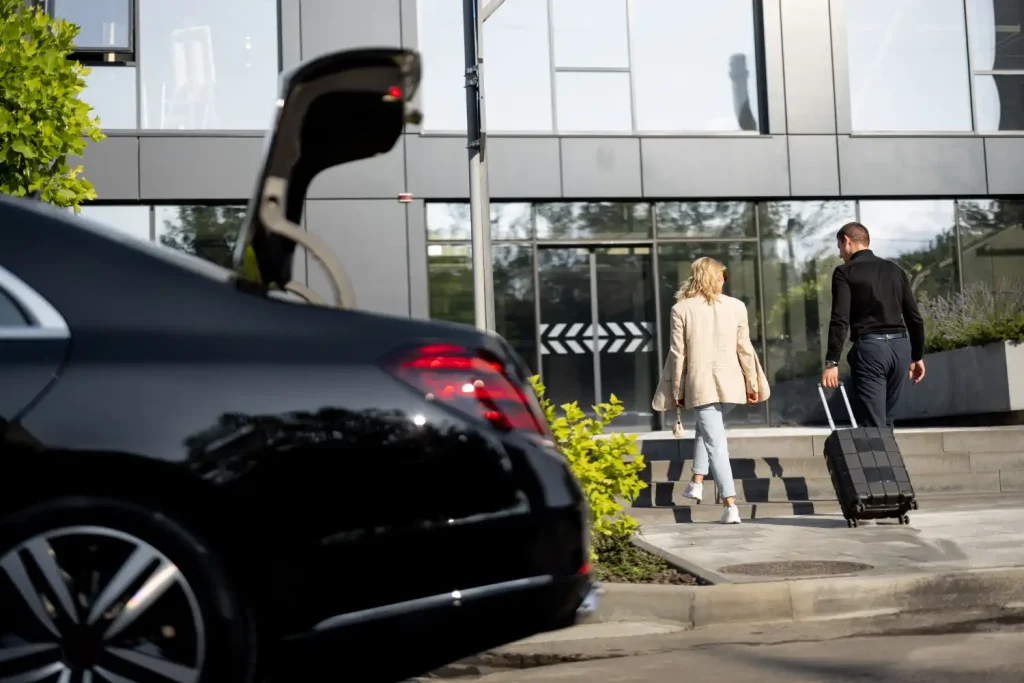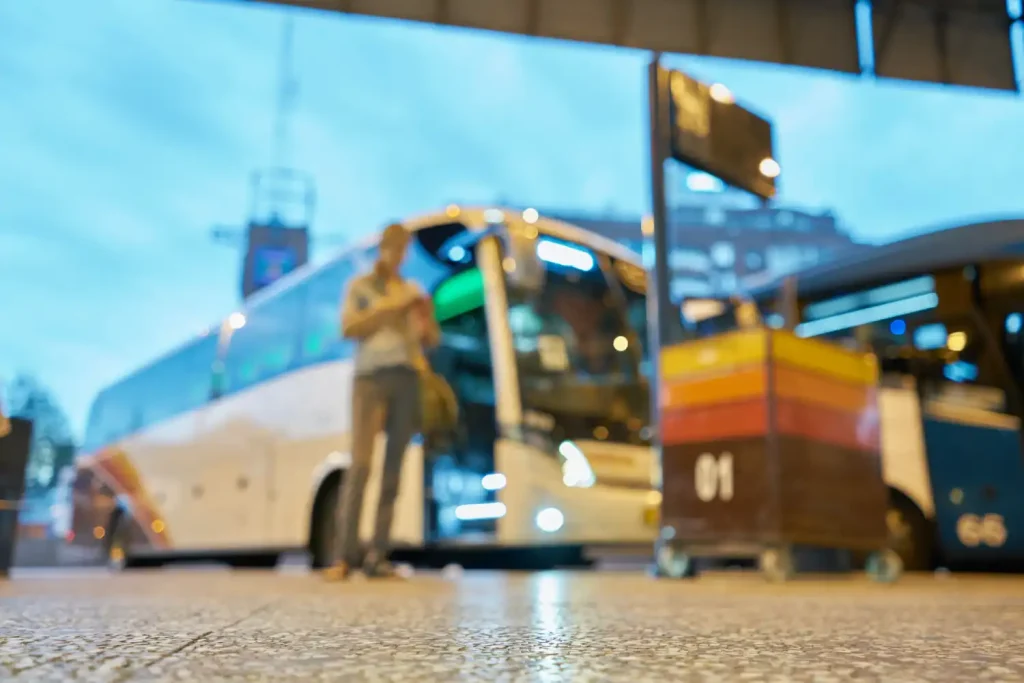
Deciding between by taxi and by bus when travelling longer distances can be challenging. Taxis offer flexibility and convenience that public transport cannot provide. Passengers have the option of taking a direct route without the need for transfers, which can significantly reduce travel time.
Another reason for choosing a taxi is its adaptability. Drivers can adjust the route according to the current road conditions, minimising delays caused by traffic jams or closures. In addition, taxis are often better equipped to transport people with reduced mobility, increasing their accessibility to a wider group of passengers.
In terms of safety and comfort, a taxi provides a more personal experience. Passengers are provided with a vehicle that meets strict quality and maintenance criteria, increasing their comfort and sense of security throughout the journey.
Advantages of Taxi when travelling longer distances
When it comes to choosing long-distance transport, taxi companies offer several significant advantages for passengers.
Flexibility and Comfort
Taxis offer exceptional convenience for passengers. One of the key advantages is the ability to adapt to individual needs. Taxis allow passengers to choose the exact route and departure time to suit their preferences. This is especially important if travel plans are unpredictable or involve locations that are not easily accessible by bus.
Comfort is another important factor. Taxis provide a private space that is not available on public transport. Compared to a bus, they provide more comfortable seats and more options, such as air conditioning, which increases comfort throughout the journey. Additionally, there are no transfers with taxis, which means passengers can focus on their destination without the stress of having to organise multiple transport links.
Speed and Time Savings
Speed is an important reason why some passengers choose a taxi over a bus. Routes are planned to minimise travel time and provide the fastest possible connection between origin and destination.
Taxis offer significant time savings, especially in situations where buses or other forms of public transport are not available for direct routes or during late night hours. Taxis can respond immediately to current traffic conditions and provide quick solutions to overcome obstacles that would otherwise cause delays. In addition, taxis are available on demand, eliminating the need to wait for connections or routes with multiple stops.
These factors make taxis a good choice for those looking for efficient and comfortable transportation for a longer journey.
Disadvantages of Public Transport

Public transport, such as buses, has several disadvantages that can affect the comfort and efficiency of travelling longer distances. These aspects may be a deterrent to some passengers.
Limited Time Connections
Public transport links are often tied to a fixed schedule, which means that passengers have to adapt to set times. Independence in journey planning is therefore limited, especially if some connections are absent at certain times of the day. Passengers have to plan their journeys very carefully to avoid long waiting times. This problem is particularly common on lightly frequented routes, where the intervals between connections can be several hours.
Intermissions
Delays are a common problem in public transport systems. Unplanned delays occur due to congestion, adverse weather conditions or vehicle breakdowns. Such situations require a lot of flexibility from passengers and often forced changes of plan. Therefore, passengers have no guarantees as to the exact time of arrival at their destination. This can be particularly critical over longer distances, where any delay means a significant loss of time.
Lack of Privacy
Unlike taxis, public transport does not offer privacy as passengers share space with others, which can be inconvenient, especially during rush hour. The limited space and the constant movement of other passengers can significantly affect the comfort level during the journey. Some passengers may experience stress due to noise or overcrowding, which reduces the overall travel experience. For those who prefer peace and quiet and the opportunity to work or relax during the journey, privacy in a taxi can be crucial.

Comparison of Taxi and Bus and Train Prices
When is Taxi Cost Effective
Taxis can be cost-effective for longer distance transportation in some situations. If it is a multi-passenger trip, the cost can be split, reducing the total cost per person. Travel time is also important, as taxis offer a faster and more direct route without unnecessary downtime. If deadlines are tight or flexibility is needed, taxis offer a quick transfer to exactly where you need to be. Other factors, such as luggage transportation and passenger comfort, can play an important role when deciding on a taxi.
Bus or train connections may require multiple transfers, which means both lost time and increased stress for passengers. For example, if the destination is somewhere off the main routes, a taxi may be the ideal choice for a direct connection. For journeys where there are delays or complications on public transport, taxis offer a reliable alternative.
When to prioritise public transport sooner
Public transport seems to be a good option if you are travelling alone, without other passengers. For those travelling alone over long distances, a bus or train is cheaper than a taxi. Using prepaid tickets or discount cards, where tickets are cheaper, can reduce costs even further.
If the destination lies directly on a main transport route, public transport offers efficiently scheduled connections with fixed time intervals. For regular or daily routes, public transport is also advantageous because of its predictability and fixed timetables. Where catchment car parks are available, it is possible to combine the car with bus or train, thereby reducing the cost of fuel and parking charges.
In terms of environmental impact, public transport uses fewer resources per person, contributing to a lower carbon footprint and less pollution. This is another reason for many eco-conscious travellers to prefer the bus or train over a taxi.

Passenger Experience
Travellers on longer routes appreciate the advantages of travelling by taxi over buses, which include flexibility, comfort and personalised service.
Why private transport companies should also be looked at when planning a trip
Private transport companies offer a number of benefits that can be useful when planning long journeys. The drivers of these services are often better prepared to handle difficult situations on the road and provide a customer-focused service. When planning a trip at the last minute, companies such as FlixBus increase the price of transport tickets if you are travelling as a group and with luggage, you can easily exceed the price you would pay for a taxi together. Therefore, we always recommend checking all available options before booking your transport.
Convenience factor on Long Routes
In a private vehicle, there is a spacious interior where passengers have plenty of room for themselves and their luggage. Comfort is also enhanced by high-quality air-conditioning and ergonomic seats, which make for a pleasant drive even over long distances. In addition, taxis can better serve people with reduced mobility, which is often a significant advantage over bus services. This increased comfort and personalised service make taxi services an attractive option for long-term travel.
When to Choose a Taxi

Travelling with Luggage or Children
When transporting a lot of luggage or small children, it may be advantageous to choose a taxi. Taxis allow you to comfortably store larger amounts of luggage, which can be easily loaded into the luggage compartment or on a roof rack. Parents with children, on the other hand, will appreciate the private space where children can rest freely and not feel the pressure of sharing space with other passengers. Safety regulations such as child car seats can be used efficiently, which is often more difficult to accommodate in a bus due to capacity constraints.
Small time reserve
If the traveller has limited time, a taxi can be a practical option. Taxi routes are direct and customizable, which can save precious hours that a passenger would otherwise spend transferring or waiting for a connection. When travelling to the airport or important meetings, this time saved can prove crucial. Taxi services such as KošiceTaxi24 they work flexibly and can respond to unexpected situations such as traffic accidents or road reconstruction.
Working Journeys
For people on business trips, taxis are an efficient way to tailor the journey to their individual needs. Whether it's an important business meeting or a trip to the airport, flexible departure and arrival times provide convenience and reduce the stress associated with long-term planning. Taxi drivers are ready to provide quality customer service, which is ideal for international visitors or people who need to travel for business. Also, taxi services provide the opportunity for constant contact and communication with the passenger.
Conclusion
Several factors play a role when deciding between a taxi and a bus for longer distances. Taxis offer flexibility, comfort and privacy, which can be crucial when you have unpredictable plans or are travelling with luggage and children. Their ability to adjust the route and departure time to suit passengers' needs is a big plus.
On the other hand, public transport can be a more economical option for individuals, especially on major routes with frequent connections. The environmental aspect of buses also appeals to those who prefer sustainable travel. The choice between taxi and bus depends on individual needs and preferences, with each mode having its advantages and disadvantages.